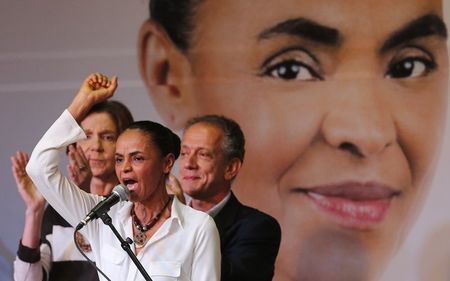SAO PAULO (Reuters) - Opposition presidential candidate Marina Silva said on Friday that Brazil's recession is very worrying and her government would work to restore the credibility of the country's economic policies to recover investment and growth if elected.
The Brazilian economy fell into recession in the first half of the year, a heavy blow for President Dilma Rousseff's already diminishing hopes of winning re-election in October.
Silva said she would limit increases in public spending to below the growth rate of the economy, and restore transparency to government accounts by setting up a fiscal responsibility council to oversee its expenditures.
"We will be transparent. We will not use creative methods to make the accounts look good," she said in reference to the Rousseff administration resorting to alternative accounting to try to meet an annual fiscal savings target.
Silva, a renowned environmentalist who has surged in the polls since entering the race last week, spoke to reporters after unveiling her government programme, which focuses on economic policies to restore growth after three years of lacklustre performance.
The programme calls for an end to the central bank interventions in the foreign exchange market that have strengthened the real currency, and propose a return to a free floating exchange rate that would protect Brazilian manufacturers and help exporters.
It also called for an overhaul of Brazil's complex and onerous tax system. Silva's programme does not include a wealth tax, but she said such a tax would be part of a tax reform debate.
Silva also plans to put a price on greenhouse gas emissions and implement a national carbon market if elected, according to her policy proposals.
Silva earned the wrath of Brazil's powerful agribusiness sector a decade ago, but her programme emphasized the importance of agriculture for the Brazilian economy. She denied she opposes hydroelectric dams in the Amazon basin.

Two polls this week showed Silva defeating Rousseff in a second-round runoff and ending 12 years of rule by the leftist Workers' Party.
(Reporting by Eduardo Simoes. Writing by Brasilia newsroom; Editing by Andre Grenon)
